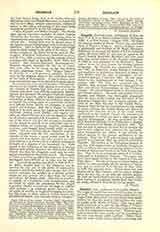

Chapelle, PLACIDE-LOUIS, Archbishop of New Orleans, U.S. A., b. at Runes, Lozere, France, August 28, 1842; d. at New Orleans, August 9, 1905. He began his classical studies at Mende, France, and concluded them at Enghien, Belgium. After a brilliant course of philosophy and theology at St. Mary’s Seminary, Baltimore, he received the degree of S.T.D. Ordained priest, June 28, 1865, he was sent as pastor to St. John’s Church, Rockville, Maryland, and four years later was named pastor of St. Joseph‘s, Baltimore. In 1882 he was appointed to St. Matthew’s, Washington, where he soon became the leading Catholic clergyman. Dr. Chapelle was consecrated November, 1891, at Baltimore, titular Bishop of Arabissus and coadjutor to Archbishop Salpointe of Santa Fe, New Mexico, with the right of succession; he succeeded to that see, January 7, 1894. He was transferred to the Archbishopric of New Orleans, December 7, 1897. The Holy See appointed him, October 11, 1898, Apostolic Delegate to Cuba and Porto Rico and Envoy Extraordinary to the Philippine Islands. He proved himself equal to this important and delicate mission. He spoke with facility French, Spanish, and English, was thoroughly acquainted with the laws of the Church and the spirit of the American Constitution, and rendered valuable services to the Holy See and to the United States. Being in Paris during the negotiations for the treaty of peace between the United States and Spain, he obtained the insertion therein of the clause which confirmed to the Catholic Church the possession of all properties to which she had a right under the Spanish Government. He was appointed by Leo XIII Apostolic Delegate to the Philippines, August 9, 1899, and arrived at Manila, January 24, 1900. His first act was to persuade General Otis to liberate the priests and religious held prisoners by Aguinaldo After reorganizing the affairs of the Church, he helped greatly in the general pacification of the country. Pope Leo XIII acknowledged and highly praised in a pontifical Brief the work of Archbishop Chapelle. His mission in the Philippines being at an end, Leo XIII retained him as Apostolic Delegate to Cuba and Porto Rico and named him Assistant to the Pontifical Throne and Count of the Holy Roman Empire. Pius X, in an autograph letter of October 8, 1904, said to Archbishop Chapelle: “You have rendered most signal services to the Church in Cuba and Porto Rico.” Though having an auxiliary bishop, he wished to visit personally all the parishes of Louisiana, and he returned from Havana, May 30, 1905, to fulfil this pastoral duty. Yellow fever had just broken out in New Orleans, and he started without delay for the city, to be with his stricken people. He took the fever himself, and died, August 9, 1905, after having in a pastoral, written four days before his death, offered to God his life for his people.
A. ORBAN

